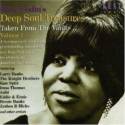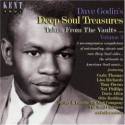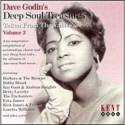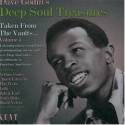Deep Soul?
|
Discussion around the definition of Deep Soul has long been a thorny old issue, bolstered in the past by the release of CDs such as "Dave Godin's Deep Soul Treasures". The initial CD release ended up being followed by three further volumes of largely excellent material, although it has to be said there was the odd inferior cut on each of the compilations. (Whilst we’re on the subject of great releases by the way, don’t miss out on another excellent CD series from the Kent stable with superb liner notes from Dave Godin called "The Birth Of Soul" - at the time of writing there are now four in the series). One of the more persistent themes in this perennial discussion is that the most critical component is the vocal intensity of the performance - pretty much a 'no-brainer' and more relevant than the tempo or the arrangement for example. On the Deep Soul Treasures releases there are a variety of arrangements, with echoes of doo-wop and the influence of gospel apparent on many of the sides; and, of course, there are plenty of instances which add to the theory that Deep Soul is the logical and natural successor to the blues (and a development of it). I'd be lying if I said I was aware of all of the tracks on the initial CD prior to purchase and I'd also be lying if I said I wasn't surprised by the quality on offer. This is also true of subsequent releases, where the familiar cuts mix with the more obscure to create a delightful excursion back to the heyday of classic soul - a time when it was exciting and vital, not least because it was so very new. These releases prove that just when you think you've heard all there could possibly be of any value or merit in the genre, up pops an anthology that makes you redefine and rethink your priorities. On the first CD, tracks such as The Knight Brothers (‘I'm Never Gonna Live It Down’), Bessie Banks (‘Try To Leave Me If You Can’) and Jean Stanback (‘I Still Love You’) are as strong as any of the 'usual and familiar' soul sides with which we are all familiar. What in truth these four volumes of "deep soul treasures" ultimately fail to help define is the true nature of deep soul itself. They don't confirm to a standard pattern (thank God) and even by Volume 4 we still get well known tracks such as Bobby Bland's 'I Pity The Fool', Clarence Carter's 'Slip Away' and Irma Thomas's 'Time Is On My Side' sitting alongside the much less familiar. And although these tracks are all excellent examples of the various facets of soul music, 'Slip Away' (or the superb 'I Pity The Fool' for that matter) has never seemed to me to be the epitome of what I recognise as deep soul. It's probably heresy to many lovers of the genre, but is it worth even attempting to label anything in quite such a specific way? Does it encourage new listeners into the fold or help drive them away? After all, the bottom line is that we all recognise quality when we hear it and as a Primer we are interested predominantly in encouraging more listeners into the fold. Dave Godin spent a lifetime promoting and supporting this kind of music in the UK - he played a crucial role in getting more of the Motown label released in this country for example. He describes these releases as the definitive Deep Soul collection; I'm not sure about that. Nor would they be the natural starting point for those new to the music. But for those looking for a wonderful collection of less well known soul classics they could well be essential purchases.
 |
|




You may be interested in an article I wrote entitled "Deep Soul - Towards A Definition" for the excellent deep soul site "Sir Shambling's Deep Soul Heaven". The link is here:
http://www.sirshambling.com/articles/ds_defined/deep_soul_defined.html
Best wishes to all Shades members. Pete Nickols.